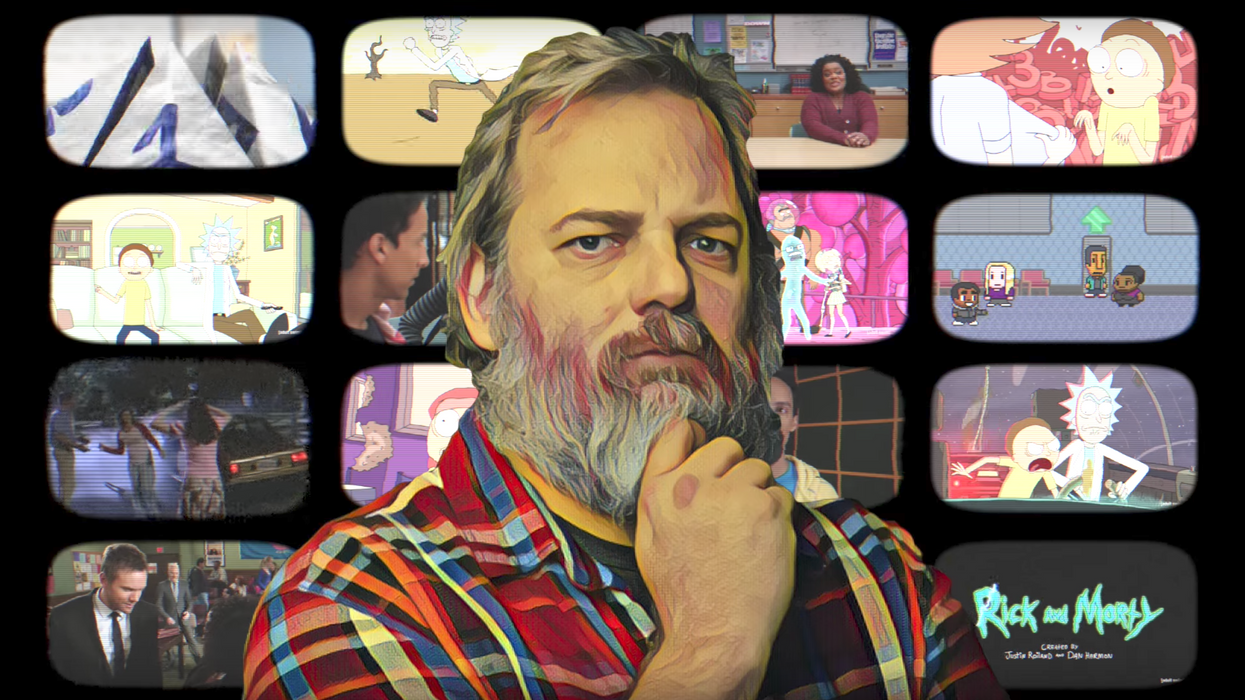What Dan Harmon's Improvised Cartoon Can Teach You about Instinctual Storytelling
"You are a storyteller. You were born that way." —Dan Harmon

Does storytelling come naturally to you? That's kind of a tricky question, right? On one hand, we can pretty capably tell a co-worker about our crazy weekend, but on the other hand, we can spend hours staring at a blank page, completely stuck on how to write our next scene. Really, while storytelling might be an inherent skill we're all born with, the ability to put that skill to work on paper may not be.
However, one writer that seems to really have this screenwriting thing down is Dan Harmon. His work on Community, Rick and Morty, and countless other TV series has shown us that consistent quality is attainable, but one show, in particular, reveals a unique spirit of storytelling that relies less on talent and labor and more on creative instinct, the improvised D&D knock-off HarmonQuest. In this video essay, Sage Hyden of Just Write discusses what screenwriters can learn about storytelling from improv, practice, and going with your gut.
If you're unfamiliar with HarmonQuest, you really shouldn't be—because it's amazing. Available only on the VRV streaming platform, the improv show, which is half live action and half animated, features experienced improv comedians Dan Harmon, Erin McGathy, and Jeff B. Davis, as well as Spencer Crittenden who serves as game master, performing a fantasy roleplaying campaign, much like Dungeons and Dragons, in front of a live audience. Basically, it's like watching your friends play D&D, only your friends are brilliant comedians and sometimes their adventure is animated.
As you watch HarmonQuest, as a writer, anyway, you start to become strangely very, very aware that a story is being crafted right before your eyes. This is obviously unlike traditional television and film, where you're watching a fully fleshed-out story performed by skilled actors who have spent months memorizing lines and getting into character. HarmonQuest is often a messy, 4th wall-breaking shit show (in a really good way, though), especially when they have a guest player on who doesn't quite "get" live action roleplaying games. (Case in point, Gillian Jacobs as Chip. Certainly one of the most hilarious episodes.)

But here's the thing—despite all of the missteps, the breaking of character, Jeff B. Davis' adorable stammering, Dan Harmon's incessant eye-rolling, even the pauses to debate whether or not a player is using their turn correctly, you never get completely jostled out of the storyspace because the players never stop rolling with the new information constantly being put on the table. The trio is always pushing the story forward, whether it's with funny banter or unexpected character developments, to keep the audience engaged and entertained.
And that is something screenwriters could really learn from. The storytelling instincts of Harmon, McGathy, Davis, Crittenden, and their special guest players don't just make us laugh, they also lead us further into the world beyond Earthscar. Yeah, a lot of the credit for the success of the show goes to their comedic prowess, but it's also due to their off-the-cuff world and character building. Because without that, what do you have? A variety show without variety? Sketch comedy with only one sketch? Harmon's instincts for giving his character, Fondue, a character arc and a major flaw (cowardice), makes the viewer want to come back for more—you know—stay up until 5 a.m. binge-watching it and then go to work two hours later—or, you know—seriously, seriously consider signing up for VRV's premium service to watch the second season, even though the only reason you downloaded VRV in the first place was to watch HarmonQuest and a month into it is still the only damn show you watch on the shit.
But, I digress.
So, is storytelling innate? Kind of. We're all storytellers; that's kind of how humans interact with each other. But in order to be a good storyteller, I think we've learned that you need some good instincts and a lot of practice. If you're currently stuck on a script, you might want to actually try some improv or roleplaying to not only get the ideas flowing, but to also get more familiar with story structure.
Source: Just Write












